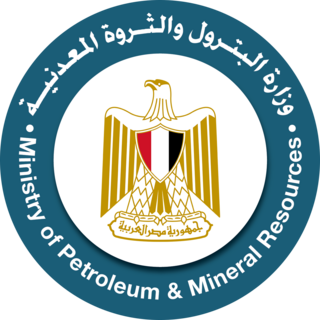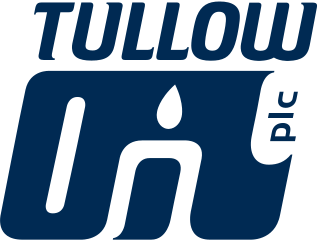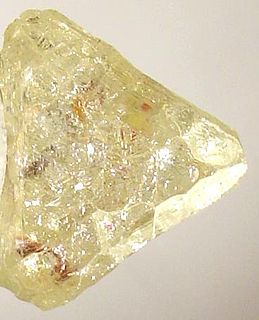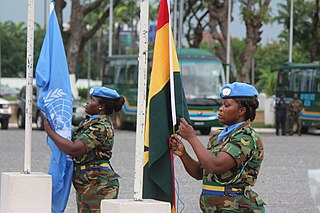
The economy of Ghana has a diverse and rich resource base, including the manufacturing and exportation of digital technology goods, automotive and ship construction and exportation, and the exportation of diverse and rich resources such as hydrocarbons and industrial minerals. These have given Ghana one of the highest GDP per capita in West Africa. Owing to a GDP rebasement, in 2011 Ghana became the fastest-growing economy in the world.

The first independent Ministry of Petroleum was established in March 1973, to manage the political role of petroleum resources before the war of 1973. In view of the strategic significance of the Ministry's existence as a political body that sets the general petroleum strategies on new bases to go in line with the requirements of the country at this stage. On top of its priority list, is to provide the local market needs of petroleum products, petrochemicals and mineral resources, and to contribute to achieving the targeted growth rates of the national economy.

The Ministry of Petroleum (MOP) (Persian: وزارت نفت Vezârat-e Naft) manages the oil industry, the producer of oil and petrochemical products. MoP is in charge of all issues pertaining to exploration, extraction, exploitation, distribution and exportation of crude oil and oil products. In addition, according to the "Imports and Exports Regulation Act", issuing import licenses for such products is also among the functions of the Ministry of Petroleum. According to BP, Iran's has 137.6 billion barrels (2.188×1010 m3) of proven oil reserves and 29.61 trillion cubic meters of proven gas reserves. Iran ranks third in the world in oil reserves and second in gas reserves. It is responsible for applying the principle of Iranian ownership and sovereignty over oil and gas reserves. Also, it is undertake the separation of sovereignty tasks from management and development of country's oil and gas industry.
Articles related to Ghana include:
Manufacturing in Mexico grew rapidly in the late 1960s with the end of the US farm labor agreement known as the bracero program. This sent many unskilled farm laborers back into the Northern border region with no source of income. As a result, the US and Mexican governments agreed to The Border Industrialization Program, which permitted US companies to assemble product in Mexico using raw materials and components from the US with reduced duties. The Border Industrialization Program became known popularly as The Maquiladora Program or shortened to The Maquila Program.

Augustus "Goosie" Obuadum Tanoh is a Ghanaian politician and international businessman who has served in both public and private sectors in his country Ghana. He was the leader of the National Reform Party, a breakaway group from the National Democratic Congress between 1999 and 2007 and represented this party in the 2000 presidential election, where he garnered 1.1% of the national vote. He returned to the National Democratic Congress with his colleagues from the National Reform Party at the behest and upon several appeals made by the late President John Atta Mills in 2007/2008. Tanoh is originally a founding member of the National Democratic Congress.

Tullow Oil plc is a multinational oil and gas exploration company founded in Tullow, Ireland with its headquarters in London, United Kingdom.

The Mining industry of Ghana accounts for 5% of the country's GDP and minerals make up 37% of total exports, of which gold contributes over 90% of the total mineral exports. Thus, the main focus of Ghana's mining and minerals development industry remains focused on gold. Ghana is Africa's largest gold producer, producing 80.5 t in 2008. Ghana is also a major producer of bauxite, manganese and diamonds. Ghana has 23 large-scale mining companies producing gold, diamonds, bauxite and manganese, and, there are also over 300 registered small scale mining groups and 90 mine support service companies.

The petroleum industry of Ghana is regulated by the state-owned Ghana National Petroleum Corporation (GNPC) and administered by the state-owned Ghana Oil Company (GOIL).

Ghana generates electric power from hydropower, fossil-fuel, and renewable energy sources. Electricity generation is one of the key factors in order to achieve the development of the Ghanaian national economy, with aggressive and rapid industrialisation; Ghana's national electric energy consumption was 265 kilowatt hours per capita in 2009.

The mineral industry provides a major source of economic growth in Peru's national development. In 2006, Peru occupied a leading position in the global production of the following mineral commodities: fourth in arsenic trioxide, third in bismuth, third in copper, fifth in gold, fourth in lead, fourth in molybdenum, fourth in rhenium, first in silver, third in tin, and third in zinc. In Latin America, Peru was the first ranked producer of, in order of value, gold, silver, zinc, lead, tin, and tellurium and the second ranked producer of copper, molybdenum, and bismuth.

The Ghana National Petroleum Corporation (GNPC) is the state agency responsible for the exploration, licensing, and distribution of petroleum-related activities in Ghana.

The Tema Oil Refinery (TOR) is one of two crude oil refineries in Ghana.

Ghana Oil Company, known as GOIL, is a state-owned Ghanaian oil and gas marketing company, formed on 14 June 1960. Currently it holds the place of Ghana's top oil marketing company, and is the only indigenous owned petroleum marketing company in Ghana.
The petroleum fiscal regime of a country is a set of laws, regulations and agreements which governs the economical benefits derived from petroleum exploration and production. The regime regulates transactions between the political entity and the legal entities involved. A commercial or legal entity in this context is commonly an oil company, and two or more companies may establish partnerships to share economic risks and investment capital.
Ardova Plc is an indigenous energy group, headquartered in Lagos, Nigeria, with extended operations in Ghana. It operates majorly in the downstream sector of the Nigeria’s Oil and Gas industry, but has diversified its businesses into other sectors of the energy value chain. The downstream division specializes in the distribution of a wide range of petroleum products; Premium Motor Spirit (PMS), diesel, aviation fuel, kerosene, as well as a range of lubricants for various automobiles and machines; distributed mostly to the automobile, industrial, aviation and marine markets.
Phyllis M. Christian is a Ghanaian lawyer and consultant who has been called "one of the most influential women in Ghana". A lawyer by training, she is also the founder, chief executive officer and managing consultant of ShawbellConsulting, based in Accra. Her grandfather George Alfred Grant, popularly known as Paa Grant, was one of the founding fathers of Ghana.

The Ghana–United States Status of Forces Agreement was a proposal made by the United States Department of Defense to the government of Ghana in 2018. Despite historical cooperation between Ghana and the United States, the proposal was controversial due to concerns that the agreement would offer undue privileges to the United States, including a particularly controversial section allowing the construction of a United States military base in Ghana. Ghana's President Nana Akufo-Addo, has denied the agreement includes permission to build a military base.
The Petroleum Commission is a Ghanaian state agency under the Ministry of Energy and Petroleum responsible for the regulation, management and coordination of all activities in the upstream petroleum industry for the benefit and welfare of Ghanaians. The commission was established in 2011 as an independent regulator in the petroleum sector of Ghana.











